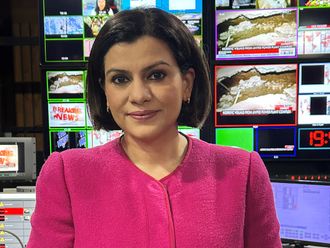The Arab people, almost anywhere from "the Atlantic to the Gulf," are nowadays seething with anger more than at any time in recent decades, partly because of their poor economic conditions and rising unemployment as well as the absence of good governance.
But equally shattering has been the feeling that their rulers are not responsive to their political goals and only serve as instruments in the hands of the big powers, especially the United States, which has been a firm ally of Israel, the usurper of the Palestinian homeland.
This has been clearly illustrated after the pace-setting Jasmine Revolution in Tunisia forced the country's president and his family to flee to Saudi Arabia, and served as a torch for many in the region, especially Algeria, Egypt, and Yemen, where some demonstrators have been killed.
The ongoing turmoil reported in Sudan, Iraq and Lebanon, where all have experienced political and confessional strife, is about to splinter Sudan, and divide Iraq despite the imminent withdrawal of American troops from occupied country.
As far as Lebanon is concerned, the country this week passed through a cataclysmic change whereby Hassan Nasrallah, Secretary-General of Hezbollah, has emerged as a kingmaker when he succeeded in bringing about the downfall of the government led by Sa'ad Hariri, son of the assassinated prime minister, Rafik Hariri, and managed to impose a successor, Najeeb Mikati, a former prime minister.
All this came about because of the captivating issue in Lebanon of the Special Tribunal Lebanon (STL), a UN-sponsored body which has been looking into the 2005 assassination of Prime Minister Hariri and 22 others.
The secret indictments, handed down last week, are believed to name prominent Hezbollah members as the guilty parties in carrying out the crime. Nasrallah had reportedly wanted Sa'ad Hariri, who succeeded his father as the prime minister, to denounce the STL but he refused. Whether the prime minister-designate will do that is still an open question.
The more sensational issue at this hour are "The Palestinian Papers", a cache of secret diplomatic cables covering the period 1999 to 2010 and acquired by Al Jazeera, an Arabic and English language television network seen worldwide, and shared exclusively by the Guardian of London.
The more than 1,600 documents exposed the give-and-take in negotiations in recent years between Israel and the Palestinian National Authority where the Palestinians seemed to be giving more than taking.
"The documents," according to Aluf Benn of Haaretz, "show that contrary to the ‘no-partner' image perpetuated by Israelis, the Palestinians were holding serious negotiations on the borders of their future state and that they produced a detailed map of territorial exchanges in the West Bank and neighbourhood partitions in [occupied] East Jerusalem."
Alarming
What was most alarming in the documents, described by the Guardian as the "biggest leak" on the Middle East peace talks, has shockingly revealed that "Palestinian negotiators secretly agreed to accept Israel's annexation of all but one (Har Homa) of the settlements [colonies] built illegally in [occupied] East Jerusalem." It added that this "unprecedented" proposal was one of a string of concessions that will cause shock waves among Palestinians and in the wider Arab world.
Another disturbing revelation was a confidential concession offered by the Palestinians included the highly sensitive issue of the right of return of Palestinian refugees. The Palestinians accepted that only 10,000 refugees would return home at the rate of 1,000 a year — a proposal that the Israelis rejected.
Kathleen Christison, a former CIA political analyst and author of several books on the Palestinian situation, highlighted in a column published this week by Counterpunch, that "the story of pressure that one US administration after another has exerted on Palestinian negotiators to make these concessions and accommodate all Israel's demands shows US conduct throughout almost two decades of negotiations to be perhaps the most cynical, and indeed the most shameful, of the three parties."
But the most shameful indeed has been the alleged acceptance of the Palestinian negotiators to offer these unbelievable concessions — a situation that obliges the Palestinian chief negotiator, Saeb Erekat, to tell all, as he has promised this week. It is time for them to come out of their shell.
George S. Hishmeh is a Washington-based columnist. He can be contacted atghishmeh@gulfnews.com.











